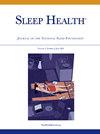Association between insomnia symptoms and chronotype—A systematic review and meta-analysis
IF 3.4
2区 医学
Q2 CLINICAL NEUROLOGY
引用次数: 0
Abstract
Objectives
This meta-analysis aimed to examine the association between chronotype and insomnia.
Methods
A systematic search of PubMed, Embase, and the Cochrane Library was conducted to identify prospective and cross-sectional studies published before July 2023. Sixteen studies involving 27,789 participants were included. Chronotype was assessed using the Morningness-Eveningness Questionnaire. Odds ratios with 95% confidence intervals were calculated for dichotomous outcomes, and mean differences with 95% confidence intervals were used for continuous outcomes. Random-effects models were applied in the presence of moderate-to-high heterogeneity. Sensitivity and subgroup analyses were performed to assess robustness and consistency.
Results
Compared with morning types, evening chronotypes had a significantly higher risk of insomnia (odds ratio, 3.47; 95% confidence interval, 2.50-4.83; P<.00001) and higher ISI scores (mean difference, 3.00; 95% confidence interval, 1.70-4.30; P<.00001). Intermediate chronotypes also showed elevated risk (odds ratio, 1.61; 95% confidence interval, 1.24-2.09; P = .0004) and moderately higher ISI scores (mean difference, 1.55; 95% confidence interval, 0.47-2.63; P = .005) compared with morning types.
Conclusion
Individuals with an evening chronotype were more likely to report insomnia symptoms compared with those with morning or intermediate chronotypes. Intermediate chronotypes tended to have a moderate association, while morning types showed the lowest likelihood of reporting insomnia symptoms. These findings highlight the importance of considering chronotype in the assessment and management of insomnia.
失眠症状与a型睡眠时间型的关系
目的:本荟萃分析旨在研究睡眠类型与失眠之间的关系。方法:对PubMed、Embase和Cochrane图书馆进行系统检索,以确定2023年7月之前发表的前瞻性和横断面研究。纳入了16项研究,涉及27,789名参与者。时间类型评估使用晨醒性问卷。对于二分类结果计算具有95%置信区间的优势比,对于连续结果使用具有95%置信区间的平均差异。在存在中高异质性的情况下应用随机效应模型。进行敏感性和亚组分析以评估稳健性和一致性。结果:与早起型的人相比,晚睡型的人失眠的风险明显更高(优势比为3.47;95%置信区间为2.50-4.83;结论:与早晨或中间时间型的人相比,夜晚时间型的人更有可能报告失眠症状。中等时间类型的人往往有中等程度的关联,而早起类型的人报告失眠症状的可能性最低。这些发现强调了在失眠的评估和管理中考虑睡眠类型的重要性。
本文章由计算机程序翻译,如有差异,请以英文原文为准。
求助全文
约1分钟内获得全文
求助全文
来源期刊

Sleep Health
CLINICAL NEUROLOGY-
CiteScore
6.30
自引率
9.80%
发文量
114
审稿时长
54 days
期刊介绍:
Sleep Health Journal of the National Sleep Foundation is a multidisciplinary journal that explores sleep''s role in population health and elucidates the social science perspective on sleep and health. Aligned with the National Sleep Foundation''s global authoritative, evidence-based voice for sleep health, the journal serves as the foremost publication for manuscripts that advance the sleep health of all members of society.The scope of the journal extends across diverse sleep-related fields, including anthropology, education, health services research, human development, international health, law, mental health, nursing, nutrition, psychology, public health, public policy, fatigue management, transportation, social work, and sociology. The journal welcomes original research articles, review articles, brief reports, special articles, letters to the editor, editorials, and commentaries.
 求助内容:
求助内容: 应助结果提醒方式:
应助结果提醒方式:


